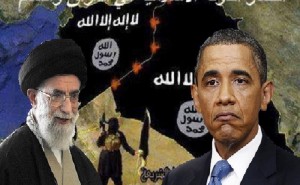Iranians making U.S. leaders look politically impotent: James S. Robbins
The United States is quickly discovering how tragically impotent the nuclear deal with Iran is. Last week, Iran tested two new ballistic missiles that the United States claimed violated United Nations restrictions on Iran’s missile program. The White House suggested imposing a new round of sanctions but abruptly ran into legal turbulence. It seems that the nuclear deal may make it difficult, if not impossible, to rein in Tehran’s ballistic missile ambitions.
There was never any explicit linkage between Iran’s nuclear and missile programs in the negotiations with Iran and six world powers – the U.S., Russia, China, Britain, France and Germany. The topic of limiting Iran’s missiles came up early in the proceedings, Iran balked and the United States dropped the matter. It did not seem to be a problem, since the United Nations and other international organizations already had sets of restrictions in place. But most of those limitations were dropped under the final terms of the deal, called the Joint Comprehensive Plan of Action.

For example, the European Union had robust anti-missile provisions that were rescinded under the deal. EU foreign policy chief Federica Mogherini said Monday at a meeting of the 28 EU foreign ministers in Brussels that because of this, the matter of Tehran’s missile tests “should be discussed in the appropriate UN bodies and not necessarily in the European Union Foreign Affairs Council
On the same day at the U.N., U.S. Ambassador Samantha Power agreed that the missile test “merits a [Security] Council response.” But Russian Ambassador to the U.N. Vitaly Churkin objected, saying that Iran’s missile test did not violate U.N. Security Council Resolution 2231, which was adopted in July 2015 as part of the nuclear deal’s implementation.
Resolution 2231 rescinded six previous resolutions aimed at restricting Iran’s nuclear and missile programs. In particular, it negated Resolution 1929, which instructed that “Iran shall not undertake any activity related to ballistic missiles capable of delivering nuclear weapons, including launches using ballistic missile technology, and that States shall take all necessary measures to prevent the transfer of technology or technical assistance to Iran related to such activities.” This language was the basis for a number of national and international missile-related sanctions.
Contrast the powerful enabling language of resolution 1929 with the feeble text that replaced it in resolution 2231: “Iran is called upon not to undertake any activity related to ballistic missiles designed to be capable of delivering nuclear weapons, including launches using such ballistic missile technology, until the date eight years after the [Joint Comprehensive Plan of Action] Adoption Day or until the date on which the [International Atomic Energy Agency] submits a report confirming the Broader Conclusion, whichever is earlier.”
Under the old legal regime, Iran was told it “shall not” engage in missile programs, and member states were empowered to take “all necessary measures” to prevent missile technology transfer. Under the new deal, Iran is simply “called upon” not to continue its missile program for eight years at the most, and member states are not granted any specific powers to stop it. Somehow in the rush to reach a deal acceptable to Iran, the anti-missile language was watered down to the point of irrelevance.
Churkin believes that this is a critical legal difference. “A call is different from a ban,” he said, “so legally you cannot violate a call, you can comply with a call or you can ignore the call, but you cannot violate a call.” Power denounced this as Russia “lawyering its way to look for reasons not to act,” and a “call” versus a “ban” is a distinction without a difference.
But the UN’s retreat from its previous, more robust language shows an important change of emphasis. Add to this the fact that Russia is readying to ship Iran S-300 air defense missiles, something which had been cancelled because of the now rescinded 2010 sanctions, plus Russia’s veto power over any future Security Council sanction resolutions, and it becomes more than simply a semantic debate. Russia holds all the cards, and it was the nuclear deal Power championed that put Moscow in that position.
Of course the Iranians never recognized or adhered to international limits on their ballistic missile program to begin with and still do not. But this incident raises the question: If Iran can get away with these missile tests because it was only “called upon” not to carry them out, what does it say about the critical language at the front of the resolution that “calls upon all Members States, regional organizations and international organizations to take such actions as may be appropriate to support the implementation of the [Joing Comprehensive Plan of Action]?” This sentence is the basis for the entire agreement. If Churkin is correct and “calls” can simply be ignored, the nuclear deal isn’t worth the paper it is printed on.


